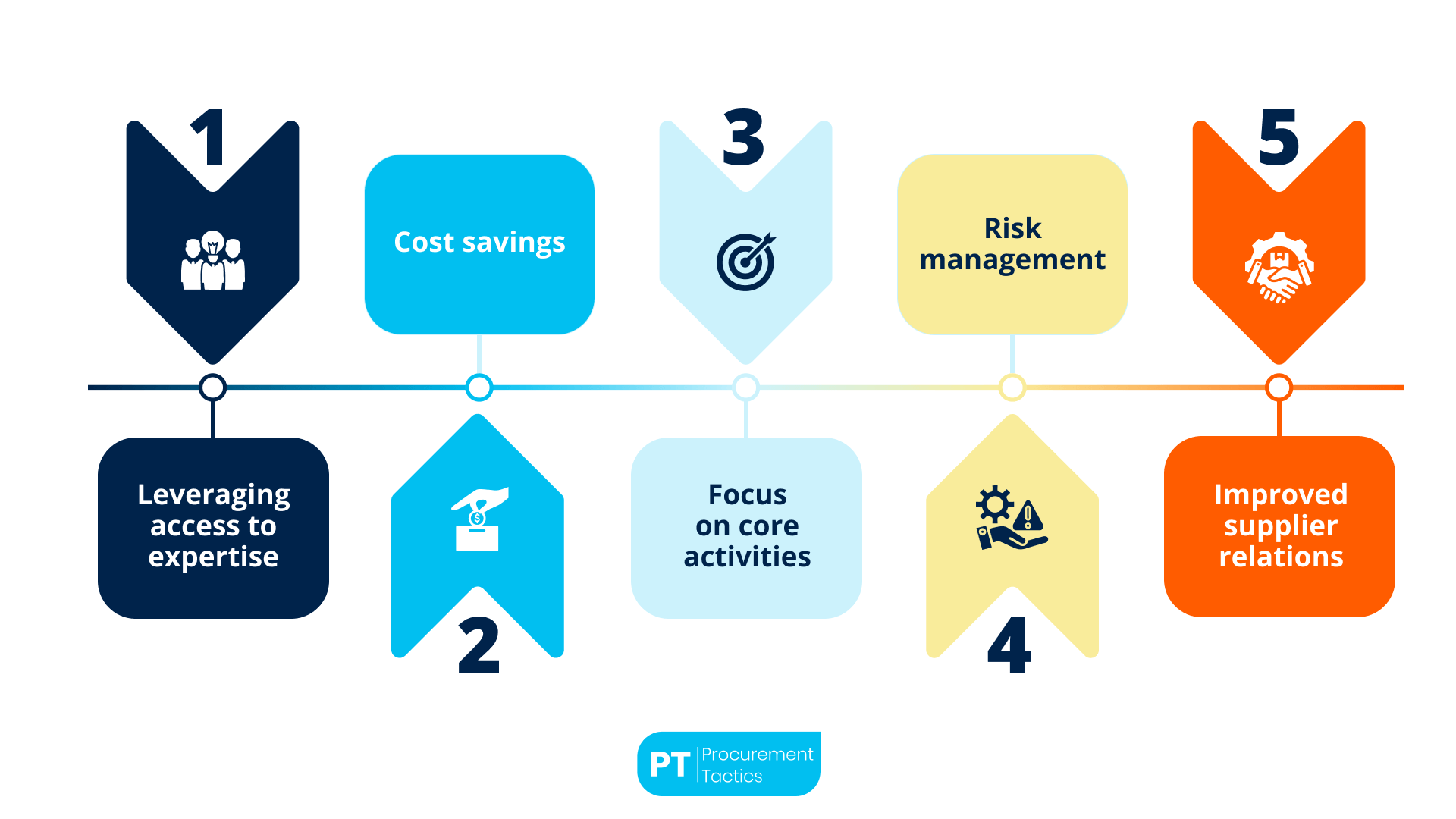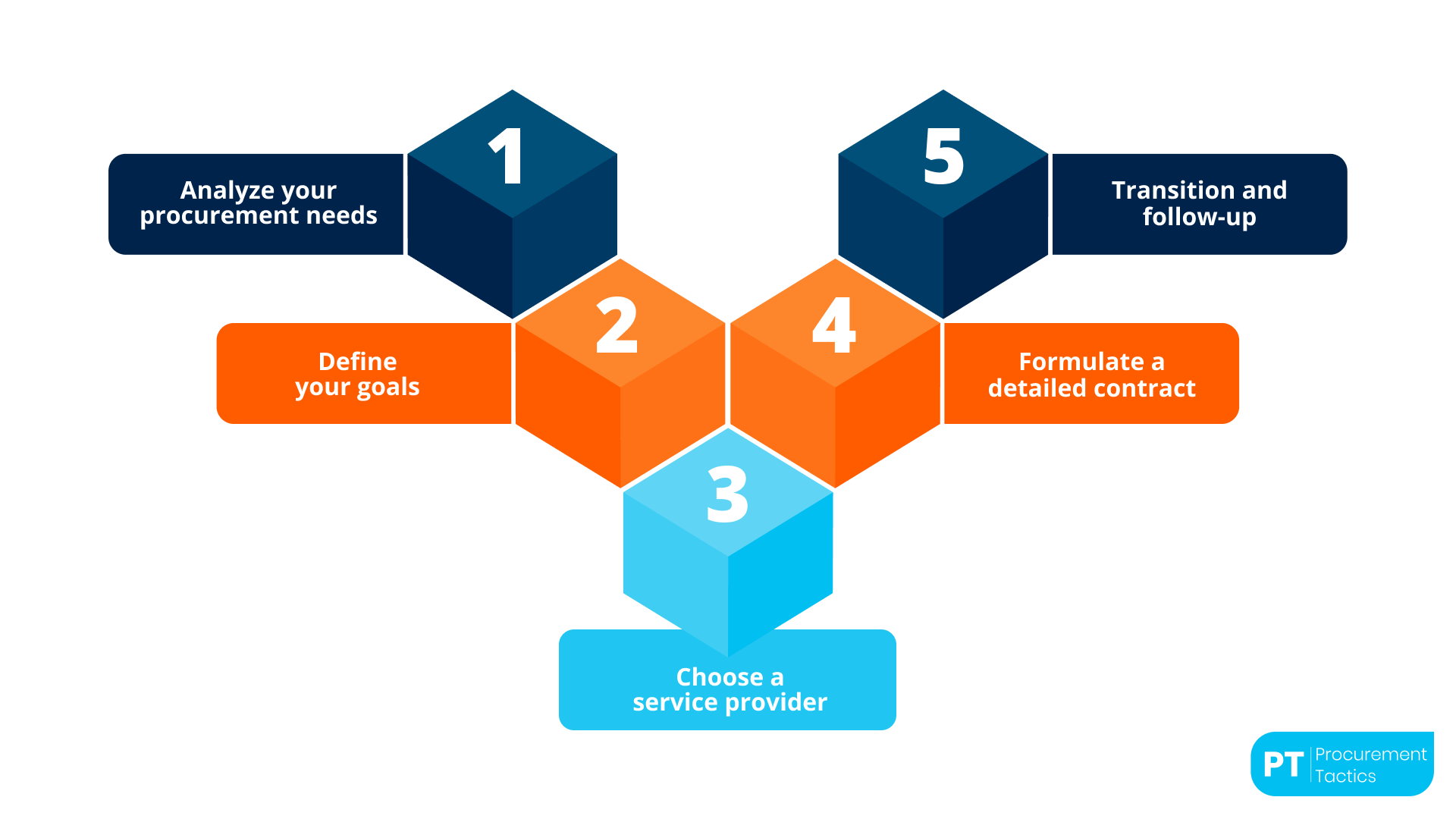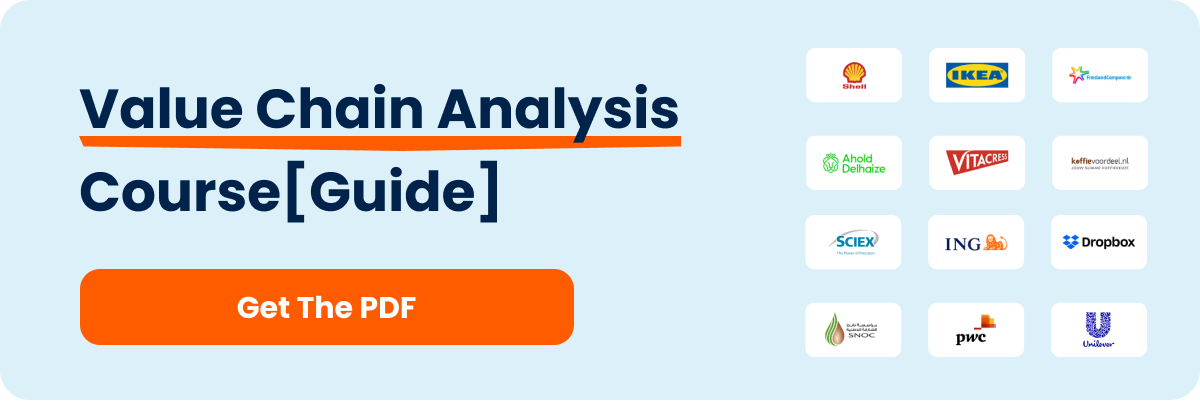Written by Marijn Overvest | Reviewed by Sjoerd Goedhart | Fact Checked by Ruud Emonds | Our editorial policy
Procurement Outsourcing — Explained + Services and Examples

As taught in the Value Chain Analysis Course / ★★★★★ 4.9 rating
What is procurement outsourcing?
-
Procurement outsourcing means hiring an outside supplier to handle parts of the procurement process.
-
Procurement outsourcing helps simplify operations and allows the company to use its internal resources elsewhere.
-
Business process outsourcing covers more types of business tasks than procurement outsourcing.
What is Procurement Outsourcing?
Procurement outsourcing can be defined as the process where a company hires an external provider to perform purchasing tasks. These tasks may include finding suppliers, buying goods or services, managing contracts, maintaining supplier relationships, and analyzing spending.
Companies often outsource non-core activities to reduce costs and improve efficiency. External providers bring knowledge and tools that help complete tasks faster and more accurately. This allows internal teams to focus on main business operations.
Procurement outsourcing helps companies get better prices, reduce delays, and manage suppliers more effectively. It can cover a few specific tasks or the entire procurement process.
Before outsourcing, a company should consider how much control it will give up, how it will communicate with the provider, and how it will protect its data. Clear roles and strong oversight help ensure the process works as expected.
When Should You Outsource Procurement?
Companies should consider outsourcing procurement when they aim to reduce costs, improve efficiency, or gain access to expert support. This approach is particularly beneficial when internal teams are small, resources are limited or when scaling operations is necessary.
One reason to outsource is cost savings. External providers often have better supplier connections and can get lower prices. They also use efficient systems that reduce time and effort.
Another reason is efficiency. Outsourcing lets external teams handle repetitive tasks. This frees up your employees to focus on more important work. It is especially helpful during business growth or market expansion.
A third reason is access to expertise. Providers bring skills, tools, and experience that your company may not have. This helps improve purchasing decisions and contract terms.
Before outsourcing, you should consider how it will affect control, communication, and data security. Clear contracts and regular checks help avoid problems.
Outsourcing works best when it matches business needs and is managed with clear goals and strong oversight.
Why Outsource Procurement?
Is procurement outsourcing the right choice for your company? Outsourcing procurement is a strategic decision that depends on a company’s specific needs and long-term objectives. From there, procurement outsourcing providers take the necessary steps to manage and improve various areas of the procurement processes.
In essence, companies often decide to outsource procurement for many reasons such as enabling access to specialized expertise, improved process efficiency, cost reduction, risk mitigation, supplier relationship management, and more.
Consequently, outsourcing procurement redirects a company’s time and energy from non-core tasks and shifts the focus toward strategic core activities, thus enhancing its competitive appeal within the market.
Moreover, leveraging expertise and capabilities through third-party service providers enables organizations to make informed decisions and navigate the various risks and complexities throughout the procurement process with maximum proficiency.
Procurement Outsourcing vs Business Process Outsourcing (BPO)
While both procurement outsourcing and business process outsourcing involve the handover of functions to third-party service providers, they differ significantly in range, scale of operations, and ultimate objectives.
Below are some of the key distinctions between the two strategies:
Examples of Companies Who Embrace Procurement Outsourcing
Across various corporate landscapes, companies may choose to outsource procurement for a number of reasons, such as leveraging lower production costs, optimizing logistics functions, accessing specialized expertise, and more.
Here are a few examples of companies that embrace procurement outsourcing:
1. Unilever
Unilever embraces outsourcing through the services and expertise of Accenture to optimize operations in its HR function. Unilever aimed to allocate its efforts to core activities, such as the development of new products and the acquisition of new companies.
For this reason, Unilever chose to outsource HR, allowing outsourcing professionals to address the opportunity to lower production costs, allowing them to produce products under brands that meet the standards and preferences of their consumers.
2. ExxonMobil
ExxonMobil is one of the world’s largest oil and gas companies. Due to the large-scale nature of its operations, ExxonMobil has employed outsourcing methods in its procurement processes to manage specific operations, such as sourcing and logistics.
This approach allows ExxonMobil to optimize its supply chain, reduce costs, and leverage expertise from third-party sources to enhance its procurement processes.
3. Nike
Nike, a leading footwear and apparel brand, utilizes outsourcing so that it can focus on product design, innovation, and marketing while accessing the expertise of outsourcing professionals.
Most of Nike’s products are manufactured outside of the United States, allowing the company to reduce overhead costs by outsourcing globally. Outsourcing allows Nike to leverage cost reduction through sourcing, manufacturing, and logistics.
4. Outsourcing of Private Label
Another common area for outsourcing is the procurement of private-label products within the FMCG (fast-moving consumer goods) market. Companies like Daymon and AMS-Sourcing specialize in this practice and are often utilized by retailers.
By collaborating with these specialized companies, retailers can benefit from their extensive knowledge of the private label market, including European markets, and their expertise in areas such as raw material prices.
Additionally, these companies can often secure goods at lower costs due to their ability to purchase in larger volumes, giving them greater buying power. I strongly recommend that every procurement director explore working with such companies, as it can lead to competitive prices and high-quality products for retailers.
Key Benefits of Procurement Outsourcing
Outsourcing can be impactful in assisting various processes. In procurement, outsourcing delivers multiple benefits to organizations, suppliers, and the procurement process itself, such as:

1. Leveraging access to expertise
Companies might consider procurement outsourcing when they don’t have the specialized expertise and skills needed to complete processes. Procurement outsourcing providers have teams of experts who can provide valuable insight and expertise in various areas of procurement, such as supplier relations, contract management, and risk mitigation.
2. Cost savings
One of the main reasons companies choose procurement outsourcing is to reduce costs. External service providers typically have scale-driven cost efficiency and expertise that can help reduce costs, allowing them to negotiate better deals with suppliers, shorten lead times, and enhance procurement processes overall.
3. Focus on core activities
Companies can transfer some or entire processes to procurement outsourcing providers, enabling them to free up internal resources and redirect focus onto their core activities.
External service providers can take on non-core functions of the process, maximizing the efficiency of procurement functions and allowing companies to concentrate on their core initiatives.
4. Risk management
Procurement outsourcing providers can effectively identify and address risks in the procurement process through robust risk management systems that help in addressing supply chain disruptions, market fluctuations, supplier inconsistencies, and others.
By extension, procurement outsourcing providers can effectively manage risks while ensuring business continuity.
5. Improved supplier relations
Procurement outsourcing providers can improve supplier relations by thoroughly evaluating key performance indicators (KPIs), track records, and terms of potential suppliers to ensure that companies have the right suppliers.
Furthermore, procurement outsourcing can significantly impact supplier negotiations by leveraging their expertise to negotiate better terms and secure the best deals.
How to Outsource Procurement
You’ve explored the challenges, solutions, and benefits of procurement outsourcing strategies. Now, how exactly do you implement it? Below are five key steps you need to take to effectively outsource procurement.

1. Analyze your procurement needs
Firstly, you need to identify your procurement needs. Ask yourself why you want to outsource, and which functions. This is part of conducting an analysis, which will involve evaluating your current procurement processes and supply chain management strategies.
From there, you will then assess which aspects of your procurement activities you want to outsource, this can encompass supplier selection, contract management, supplier relationship management, or any other procurement function.
This step will provide you with a clear understanding of your specific procurement needs and will allow you to establish the next steps.
2. Define your goals
Once you’ve established your procurement needs, you can define your goals. What does your company aim to achieve? Consider opportunities for cost savings, enhanced supplier performance, shorter lead times, expert insight, and other factors.
Outline your objectives for outsourcing procurement based on your specific needs. A clearly outlined set of goals will help you define supplier standards, contract agreements, and transition details.
3. Choose a service provider
Choosing the right service providers is crucial to the success of your outsourcing process. In selecting the right service provider, consider factors like performance records, experience, reputation, pricing terms, and range of services.
This will help you determine whether potential service providers have the right qualifications and capabilities to meet company standards, enabling you to select the right service provider from the beginning.
4. Formulate a detailed contract
Once you’ve determined the previous steps, your next objective is to formulate a detailed contract. Developing a comprehensive outsourcing contract enables companies to establish clear guidelines and policies that will ensure compliance and reliability.
Formulate a comprehensive contract outlining the range of services, key performance indicators (KPIs), data security, and exit strategies. Clarity in legal agreements also ensures that the outsourcing structures consistently meet your procurement objectives.
5. Transition and follow-up
The transition phase is the final step in outsourcing procurement and revolves around transferring tasks and other responsibilities while making adjustments and monitoring for continued improvement.
During this phase, actively engaging with your external service provider is crucial for a smooth transition. Provide enough resources and data, proper training, and comprehensive monitoring relative to performance metrics.
Conclusion
In a fast-paced corporate world that highlights the need for efficiency, procurement outsourcing offers several advantages. It is a strategic approach to the enhancement of procurement processes, allowing companies to optimize functions while also reducing costs and effectively managing supplier relationships.
Assigning specific procurement tasks to third-party service providers gives companies access to expertise and other benefits such as better cost savings, risk management, strong supplier relationships, and increased focus on core activities.
By extension, companies that outsource procurement effectively can leverage the various benefits to keep up with competitive business and evolving markets. Conclusively, procurement outsourcing can be the key to staying competitive while building continuous success.
Frequentlyasked questions
What exactly is procurement outsourcing, and how does it work?
Procurement outsourcing can be explained as the method of finding and hiring the services of an external supplier to take on various aspects of the procurement process. It involves transferring some or all functions to a third-party service provider.
Why should companies outsource procurement?
The choice to outsource procurement is a strategic approach based on a company’s specific needs. It offers several benefits such as specialized expertise, cost savings, risk management, and more. Additionally, outsourcing procurement allows companies to focus on strategic core initiatives, providing a competitive advantage in the market.
What are the steps to outsourcing procurement?
The process of outsourcing procurement involves several key steps including analysis of procurement needs, setting clear goals, choosing the right service provider, formulating a detailed contract, and finally, the transition and monitoring phase.
About the author
My name is Marijn Overvest, I’m the founder of Procurement Tactics. I have a deep passion for procurement, and I’ve upskilled over 200 procurement teams from all over the world. When I’m not working, I love running and cycling.






